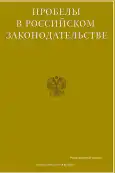Historical Aspects of Development of Agricultural Law in the Context of Requirements of Modern Legislation
- Authors: Petrushechkin P.V.1
-
Affiliations:
- Russian State Agrarian University - Moscow Timiryazev Agricultural Academy
- Issue: Vol 16, No 5 (2023)
- Pages: 283-288
- Section: Theoretical and Historical Legal Sciences
- URL: https://journal-vniispk.ru/2072-3164/article/view/250058
- EDN: https://elibrary.ru/RODDPN
- ID: 250058
Cite item
Abstract
The relevance of the study lies in the fact that almost every aspect of modern society is regulated by the legal system. Many types of relations that develop in society are regulated by the norms of laws, by-laws and other legal documents. Over the centuries, legal systems have evolved, including new laws and principles to reflect changing social, political and economic conditions. Today, legal systems are becoming more complex, therefore, without knowledge of the historical aspects of the development of law, it is impossible to understand and regulate the modern legal system.
The agricultural activity that a person carries out is necessary to ensure his existence, and this process has been carried out since the dawn of mankind. In this regard, a necessary condition is the study of the legal mechanisms of agrarian legislation for its subsequent improvement.
Agricultural law refers to the legal framework that governs agricultural practices, including farming, pastoralism, forestry, and food production. The law aims to balance the interests of farmers, consumers and the environment by ensuring that agriculture is conducted in a safe, sustainable and ethical manner.
This article is aimed at researching the scientific and historical aspects of the development of agrarian law.
The purpose of the scientific research is to study the historical aspects of the development of agrarian law in the context of the requirements of modern legislation.
In the course of the study, the influence of the facts of historical development on the current state of agrarian legislation was determined.
Full Text
##article.viewOnOriginalSite##About the authors
Pavel V. Petrushechkin
Russian State Agrarian University - Moscow Timiryazev Agricultural Academy
Author for correspondence.
Email: ppvpavel@yandex.ru
ORCID iD: 0000-0002-6230-1226
SPIN-code: 9336-9438
Cand.Sci.(Politics)
Russian Federation, MoscowReferences
- Vlasov V.A. Food supply of the region: economic and legal analysis of the category // Agrarian and land law. 2020. No. 1 (181). pp. 16–19.
- Vlasov V.A., Tkachenko A.V. On the issue of the effectiveness of the implementation of the state program of the Russian Federation "Integrated development of rural areas" in the system of higher agrarian education // Agrarian and land law. 2020. No. 4 (184). pp. 17–20.
- Eliseev V.S. State regulation of agriculture in Russia as an economic and legal category // LexRussica. 2016. No. 6 (115). pp. 103–118.
- Kurbatova S.M., Aisner L.Yu. Some aspects of legal understanding of the concept, essence and main directions of development of Russian agrarian science // Agrarian and land law. 2018. No. 7 (163). pp. 17–20.
- Minina E.L. History of formation and development of agrarian legislation in Russia // Agrarian and land law. 2017. No. 7 (151). 34.
- Navalny S.V. On some directions of the implementation of the state agrarian policy: legal and economic approaches // Legal regulation of sustainable development of rural areas and the agro-industrial complex: materials of the national scientific and practical conference (Krasnoyarsk, December 6, 2019). Krasnoyarsk, 2020, pp. 60–67.
- Review of the materials of the "round table" of the journals "State and Law" and "Legal Policy and Legal Life" on the topic "State agrarian and legal policy in modern Russia" / A.V. Malko, N.V. Krotova, S.V. Navalny [and others] // State and Law. 2017. No. 6. P. 114–121.
- Organizational, legal and economic mechanisms of rational use of natural resources and environmental protection in agriculture / B.A. Voronin, I.M. Donnik, V.V. Kruglov [and others] // Agrarian Bulletin of the Urals. 2017. No. 8 (162). pp. 10–17.
- Sorokun, P. V. Retrospective analysis of the formation of agrarian legal science in Russia / P. V. Sorokun // Epoch of Science. - 2022. - No. 30. - P. 98-103.
- Teplyashin I.V., Bogatova E.V. Legal innovations in the agro-industrial complex of Russia: directions of implementation // Agriculture. 2019. No. 3. P. 1–6.
- Teplyashin I.V., Provalinsky D.I. Formation and development of agrarian legal policy: the opinion of the student community // Law and education. 2021. No. 7. P. 101–107.
- Shanin T. Russian peasant law and inheritance //http://www.stranaoz.ru/2003/2/russkoe-krestyanskoe-pravo-i-nasledovanie-imushchestva (date of access: 27.07.2023).
Supplementary files









